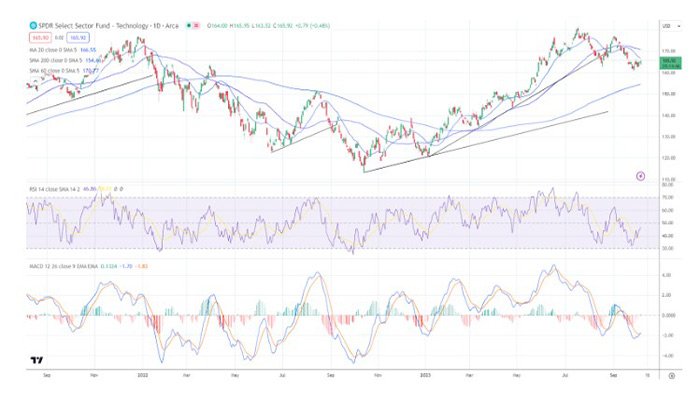Tech Stocks are Still Under Pressure

Tech stocks remain under pressure, with just slightly more than a handful keeping them afloat. The Fed’s campaign against inflation has put pressure on stock prices, especially those in the technology space, which borrow capital as part of their growth prospects. The technology sector ETF XLK (Spider Select Technology Fund) is off 8% from its highs in July.
Why Have Higher Rates Impacted Technology Shares?
Higher interest rates can sometimes impact technology shares, but the relationship between interest rates and the technology sector is complex and can be influenced by various factors. When interest rates rise, borrowing costs for companies typically increase. This situation can affect technology companies that rely on borrowing to fund their operations or invest in research and development. Higher borrowing costs can reduce their profitability and potentially slow down their growth.
Higher interest rates can make fixed-income investments, such as bonds or savings accounts, relatively more attractive than technology stocks. Investors seeking safer alternatives may shift their investments away from higher-risk technology shares, which could put downward pressure on their prices.
However, the technology sector has historically shown resilience and adaptability to changing market conditions. Technology companies often focus on innovation, which can drive their long-term growth and potentially mitigate the impact of rising interest rates.
The Leaders in a Tough Market
While most technology companies have suffered from higher rates, some larger companies with more access to capital have outperformed. These large-cap tech stocks have taken on the nickname the Magnificent Seven.
“Magnificent Seven” refers to seven of the largest and most influential technology companies in the United States. These companies have significantly impacted the tech industry and have consistently shown strong growth and innovation. Many of these companies are candidates for CFD trading. Before you begin to trade these companies, you should have a good handle on what is CFD trading.
The “Magnificent Seven” tech stocks typically include Apple (AAPL): Known for its iconic iPhone, iPad, and Mac products, as well as services like the App Store and Apple Music. Amazon (AMZN): A leader in e-commerce, cloud computing (Amazon Web Services), and various other ventures like digital streaming (Amazon Prime Video). Google (Alphabet) (GOOG/GOOGL): The parent company of Google, known for its dominant search engine, online advertising (Google Ads), and products like YouTube and Android.
Microsoft (MSFT): A technology company offering a wide range of software and hardware products, including Windows, Office Suite, Azure cloud services, and Xbox gaming. Facebook (FB): The social media giant that owns Facebook, Instagram, WhatsApp, and Oculus VR, among other platforms and services. Netflix (NFLX): A leading provider of streaming entertainment, offering an extensive library of movies and TV shows through its subscription-based platform. Tesla (TSLA): An electric vehicle manufacturer that has revolutionized the automotive industry and is involved in renewable energy and energy storage solutions.
Earnings Will Tell the Story
With higher interest rates, tech share investors will focus on Q3 earnings results and their view of Q4 earnings, which will not be available until January or February 2024. Earnings have a significant influence on stock prices. As reflected in earnings, a company’s financial performance and profitability are essential indicators for investors and can directly impact the stock price.
When a company reports strong earnings, it often indicates that it is performing well, generating profits, and meeting or surpassing market expectations. This positive news can attract investors, increase stock demand, and drive its price.
On the other hand, if a company’s earnings fall short of expectations or show a decline, it can decrease investor confidence and potentially result in a reduction in the stock price. Negative earnings surprises or disappointments can cause investors to reassess the company’s prospects and adjust their valuation accordingly.
Broader Economic Conditions
The broader economic conditions can influence technology stocks. Factors like interest rates, inflation, geopolitical events, and global economic growth or slowdowns can impact investor sentiment and market volatility, affecting technology stock prices alongside other sectors. Industry trends and market demand: Market trends and consumer demand for specific technologies or applications can affect the performance of technology stocks. Rapid growth sectors such as artificial intelligence, cloud computing, cybersecurity, and renewable energy can attract investors and increase stock prices. Changes in regulations, policies, or government actions can impact technology stocks. Regulatory scrutiny, antitrust concerns, or data privacy regulations can introduce uncertainty and potentially affect the valuation of technology companies.
Sentiment
High valuations and investor expectations can pressure technology stocks. If investors perceive that a particular technology sector or company is overvalued or if there are concerns about future growth potential, it can lead to a sell-off or a decline in stock prices.
Investor sentiment refers to investors’ overall attitude and emotional outlook towards the financial markets. It reflects investors’ collective feelings, beliefs, and expectations, which can significantly impact market behavior and asset prices. Investor sentiment can range from optimistic to pessimistic, often influencing buying and selling decisions. Economic indicators, geopolitical events, news headlines, and market trends can shape investor sentiment. Analysts often analyze sentiment indicators to gain insights into the market and make predictions about future price movements.
Can Inflation Weigh on Investor Sentiment
Inflation can alter investor sentiment. Inflation is the sustained increase in the general price level of goods and services over time. When inflation rises, it erodes the purchasing power of money, which can have several effects on investor sentiment.
High inflation can create uncertainty and decrease investor confidence. It becomes difficult for investors to predict future prices and plan their investments accordingly. This uncertainty can lead to hesitation or reluctance to invest, resulting in a more cautious or pessimistic sentiment.
Inflation can impact different asset classes differently. For example, stocks may be negatively affected as higher inflation can increase company costs, reduce profit margins, and potentially lead to higher interest rates. On the other hand, certain assets like real estate or commodities may benefit from inflation, causing investors to have a more optimistic sentiment towards those assets.
The impact of inflation on investor sentiment depends on various factors, including the rate and expectations of inflation, the performance of different asset classes, and the overall economic environment.
Do Higher Bond Yields Compete with Technology Shares for Investors?
Higher bond yields can make stocks relatively less attractive to investors. When bond yields rise, the interest rates on bonds have increased. Bonds are generally considered safer investments than stocks because they offer fixed income and lower volatility. When bond yields are higher, they can provide a more attractive alternative for investors seeking stable income.
As bond yields increase, their yields become more competitive with potential stock returns. This situation can lead investors to shift their investment allocations away from stocks and towards bonds, as the relative risk-reward profile may become more favorable for bonds. Consequently, this demand decrease can put downward pressure on stock prices.
Higher bond yields can impact the discount rate used in stock valuation models. As the cost of borrowing increases, the present value of future cash flows from stocks gets discounted at a higher rate, potentially lowering their intrinsic value. This situation can also contribute to a decrease in stock attractiveness.
What Could Help Stabilize Tech Shares?
In general, falling interest rates can often positively impact the stock market, including technology shares. When interest rates decrease, borrowing costs tend to decrease, making it cheaper for companies to fund operations and investments. This scenario can stimulate economic growth, increase corporate profits, and boost investor confidence, leading to higher stock prices. Lower interest rates can also make stocks, including tech shares, more attractive relative to alternative investments like bonds.
Is The Fed Ready to Cut Rates?
The Federal Reserve has buoyed rates and has intimated that interest rates will be higher for longer. The Fed is telling the markets that while it might not continue raising interest rates, it might not cut rates for an extended period to ensure inflation is dead before it starts worrying about growth and maximizing employment. According to the CME Fed Tool Watch, the market does not believe the Fed will begin cutting rates until the middle of 2024. Even then, the likelihood of a rate cut seems relatively unclear.
The Bottom Line
The upshot is that technology shares continue to face downward pressure due to higher interest rates likely to be around for a while. Higher inflation levels have created a situation where the Federal Reserve needed to increase interest rates and keep them higher for longer. Higher borrowing levels make it more difficult for technology companies to produce high growth, reflected in their share price. While some large-cap stocks, like the magnificent seven, continue to help buy prices, until the Fed is willing to lower rates, it will be difficult for technology shares to rally.
Follow – https://bitcointodays.com for More Updates




